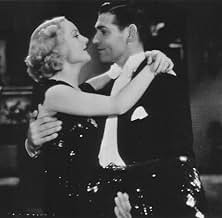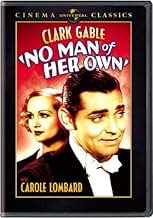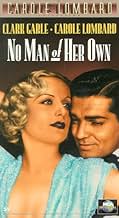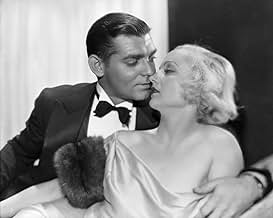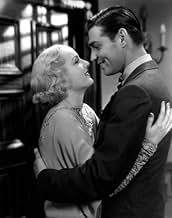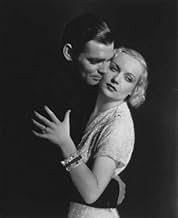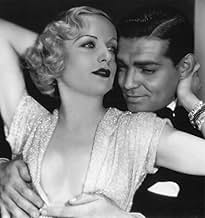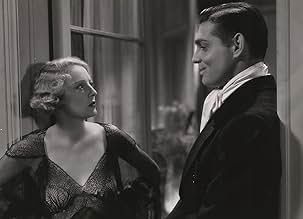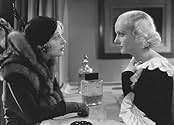IMDb-BEWERTUNG
6,6/10
1772
IHRE BEWERTUNG
Füge eine Handlung in deiner Sprache hinzuAn on-the-lam New York card shark marries a small-town librarian who thinks he's a businessman.An on-the-lam New York card shark marries a small-town librarian who thinks he's a businessman.An on-the-lam New York card shark marries a small-town librarian who thinks he's a businessman.
- Auszeichnungen
- 1 wins total
Sammy Blum
- Door to Door Salesman
- (Nicht genannt)
Mary Bracken
- High School Girl
- (Nicht genannt)
Wallis Clark
- Thomas Laidlaw
- (Nicht genannt)
Lillian Harmer
- Mattie
- (Nicht genannt)
Margaret Marquis
- Girl in the Library
- (Nicht genannt)
Empfohlene Bewertungen
No Man of Her Own is a pleasant film, nothing terribly bad or terribly good about it. It is remembered today as the only pairing of that star-crossed couple Clark Gable and Carole Lombard. At the time this was made Gable and Lombard were not an item. They became one about four or five years after No Man of Her Own was filmed. It's not on the top 10 list of either star.
Gable is a gambler/con artist who's forced by circumstance to beat it out of New York and he flees for a small suburb where he meets librarian Carole Lombard and marries her. That's as far as I'm going with the telling of the plot.
Lombard was with Paramount at the time this was made and Gable was on loan out from MGM. There's none of the Lombard we knew and loved in such classics as Twentieth Century or My Man Godfrey here. She's a pleasant enough screen heroine though. Gable does well in his part, but doesn't set the world on fire.
If someone had only predicted that Gable and Lombard and their marriage would be come legendary. I'm sure they would have been given a much better film property. I always felt that if Lombard had not been killed in that plane crash in 1942 she would have eventually signed with MGM and L.B. Mayer would have paired her with Gable in the way Katharine Hepburn signed with MGM after the success of Woman of the Year with Spencer Tracy. You might have had a few films to remember Gable and Lombard by.
Gable is a gambler/con artist who's forced by circumstance to beat it out of New York and he flees for a small suburb where he meets librarian Carole Lombard and marries her. That's as far as I'm going with the telling of the plot.
Lombard was with Paramount at the time this was made and Gable was on loan out from MGM. There's none of the Lombard we knew and loved in such classics as Twentieth Century or My Man Godfrey here. She's a pleasant enough screen heroine though. Gable does well in his part, but doesn't set the world on fire.
If someone had only predicted that Gable and Lombard and their marriage would be come legendary. I'm sure they would have been given a much better film property. I always felt that if Lombard had not been killed in that plane crash in 1942 she would have eventually signed with MGM and L.B. Mayer would have paired her with Gable in the way Katharine Hepburn signed with MGM after the success of Woman of the Year with Spencer Tracy. You might have had a few films to remember Gable and Lombard by.
I mainly got this out because I wanted to see some eye candy: Clark Gable and the wonderful Carole Lombard (plus all the wonderful '30s fashions). It's a good screwball comedy, but a little boring until Carole Lombard comes into the picture. I found some scenes unnecessary and a little boring, but there are some genuinely good scenes with Lombard in it - she really is the queen of screwball comedies. Her comic timing is wonderful. I was very much impressed. Clark is as usual very handsome and sexy. I'm not familiar with the pre Hollywood code but I guess this would be fairly risqué as Carole is shown in her underwear. A good movie, nothing special, but fun to watch.
... and I could definitely feel the chemistry between Lombard and Gable, even if they could not at this point. But it is a rather understated affair, even dragging at times.
It starts out lively and with promise, as a group of four card sharps make a killing against a mark and divide their loot. But afterwards a cop, Collins, comes up to speak to the ringleader, Jerry Stewart (Clark Gable), and lets him know he's on to what he's doing and is watching him. Also that same night, Jerry breaks up with one of his fellow card sharps, Kay (Dorothy Mackail), and she threatens to go to the DA about their activities in retaliation. Jerry decides to leave town for awhile until the immediate heat is off and travels to the tiny hamlet of Glendale. There he meets somebody who is as bored with the place as he is, town librarian Connie Randall (Carole Lombard). Things heat up quickly between them and they impulsively marry. Jerry never told Connie what he really does for a living, letting her believe he is a stockbroker. But being a gambler is all he knows, so what now, once they are back in New York? Complications ensue.
This is not a screwball comedy with Lombard doing her trademark screwball comedienne act. Lombard is a dramatic actress at this point, and doesn't really begin to hone her comedic chops until "Twentieth Century" in 1934. Gable is the one mainly carrying any comedic weight in this film, which is something he always did well.
I'd mildly recommend it mainly to see the only screen pairing of Lombard and Gable, years before they had any romantic interest in one another.
It starts out lively and with promise, as a group of four card sharps make a killing against a mark and divide their loot. But afterwards a cop, Collins, comes up to speak to the ringleader, Jerry Stewart (Clark Gable), and lets him know he's on to what he's doing and is watching him. Also that same night, Jerry breaks up with one of his fellow card sharps, Kay (Dorothy Mackail), and she threatens to go to the DA about their activities in retaliation. Jerry decides to leave town for awhile until the immediate heat is off and travels to the tiny hamlet of Glendale. There he meets somebody who is as bored with the place as he is, town librarian Connie Randall (Carole Lombard). Things heat up quickly between them and they impulsively marry. Jerry never told Connie what he really does for a living, letting her believe he is a stockbroker. But being a gambler is all he knows, so what now, once they are back in New York? Complications ensue.
This is not a screwball comedy with Lombard doing her trademark screwball comedienne act. Lombard is a dramatic actress at this point, and doesn't really begin to hone her comedic chops until "Twentieth Century" in 1934. Gable is the one mainly carrying any comedic weight in this film, which is something he always did well.
I'd mildly recommend it mainly to see the only screen pairing of Lombard and Gable, years before they had any romantic interest in one another.
Recently my favorite video store acquired this movie on DVD, and I was very hopeful in renting it. As I am a huge fan of William Powell and Carole Lombard in "My Man Godfrey," I was astonished to hear the line "See you in church," dropped casually by Lombard in the middle of this film. That line, of course, appears early on in "My Man Godfrey."
I had always thought that this was a comic device, used for that particular film, but apparently it was something of comic parlance in the 1930s. After all, there is a four year spread between this film and "My Man Godfrey". If it still has resonance now, it must have been doubly meaningful to audiences then.
The plot itself is really thin, with Gable's character "Babe" deciding to marry Lombard's "Connie" on the flip of a coin. I don't know whether that was supposed to be THE COMIC DEVICE of the film or whether it was a throw-away notion coming from the screenwriters. It really doesn't matter much because it ruined the whole notion of the film, which is that Gable's "Babe" doesn't want any attachments of any kind to interfere with his life as a card sharp and cheat.
In the social history context, it is very interesting to see a film which shows men of wealth and status in New York City -- in the third year of the great Depression ( counting 1930, '31, and '32 as the epicenter of that disastrous time ) -- casually gambling away sums of money that would easily have sustained a family of four over an entire year !!
Lombard is an intriguing personality in the history of the American cinema and every one of her performances in the '30s speaks volumes about the genius she had contained within herself. She is so wistfully beautiful and her comic timing is usually impeccable. In this film she plays a woman who thinks she is wasting away in her small town, bored with her "unsteady" boyfriend and bored with her job as a librarian. The point is, however, that she was a young woman with a job in the depths of a depression that savaged the whole of the U.S. economy.
For audiences of that era, her character's decision to toss that safety and security for an "instant marriage" to the rogue "Babe" would have been both scandalous and highly romantic. The fact that Gable's very nefarious alternative lifestyle -- as a card sharp and con man -- nets him a plush apartment and plenty of ready money, doubles the scandalous nature of the plot. The fact that he and his confederates fleece the social class known as "New York Swells" accounts for some of the film's popularity in that time and in that era.
But Gable's "Babe" is not some Robin Hood type in a tuxedo. He and his partners cheat the rich and keep the money for themselves.
They are not progressives, they are not "reformers," they are crooks.
This enjoyable film earns a 5 from me for the supporting cast of actors and from Lombard's extraordinary ease of performance. The plot itself is so near to being utter nonsense that only her luminous and magnetic beauty saves the day for the entire ensemble. Clark Gable was the "good guy" with heartburn in "It Happened One Night," which is a far, far superior film. Here, he is just flat out all criminal with heartburn and no better than the bankers of that day, who foreclosed on homes and farms with nary a thought to the long-term consequences to their customers, to society, or to the health of the country which made them so prosperous to begin with. Seventy-five years later, these nuances are probably lost on people who don't know a lot about our true American history. The formulaic "happy ending" tells me that the producers ran out of story before the actors ran out of charisma or talent.
I had always thought that this was a comic device, used for that particular film, but apparently it was something of comic parlance in the 1930s. After all, there is a four year spread between this film and "My Man Godfrey". If it still has resonance now, it must have been doubly meaningful to audiences then.
The plot itself is really thin, with Gable's character "Babe" deciding to marry Lombard's "Connie" on the flip of a coin. I don't know whether that was supposed to be THE COMIC DEVICE of the film or whether it was a throw-away notion coming from the screenwriters. It really doesn't matter much because it ruined the whole notion of the film, which is that Gable's "Babe" doesn't want any attachments of any kind to interfere with his life as a card sharp and cheat.
In the social history context, it is very interesting to see a film which shows men of wealth and status in New York City -- in the third year of the great Depression ( counting 1930, '31, and '32 as the epicenter of that disastrous time ) -- casually gambling away sums of money that would easily have sustained a family of four over an entire year !!
Lombard is an intriguing personality in the history of the American cinema and every one of her performances in the '30s speaks volumes about the genius she had contained within herself. She is so wistfully beautiful and her comic timing is usually impeccable. In this film she plays a woman who thinks she is wasting away in her small town, bored with her "unsteady" boyfriend and bored with her job as a librarian. The point is, however, that she was a young woman with a job in the depths of a depression that savaged the whole of the U.S. economy.
For audiences of that era, her character's decision to toss that safety and security for an "instant marriage" to the rogue "Babe" would have been both scandalous and highly romantic. The fact that Gable's very nefarious alternative lifestyle -- as a card sharp and con man -- nets him a plush apartment and plenty of ready money, doubles the scandalous nature of the plot. The fact that he and his confederates fleece the social class known as "New York Swells" accounts for some of the film's popularity in that time and in that era.
But Gable's "Babe" is not some Robin Hood type in a tuxedo. He and his partners cheat the rich and keep the money for themselves.
They are not progressives, they are not "reformers," they are crooks.
This enjoyable film earns a 5 from me for the supporting cast of actors and from Lombard's extraordinary ease of performance. The plot itself is so near to being utter nonsense that only her luminous and magnetic beauty saves the day for the entire ensemble. Clark Gable was the "good guy" with heartburn in "It Happened One Night," which is a far, far superior film. Here, he is just flat out all criminal with heartburn and no better than the bankers of that day, who foreclosed on homes and farms with nary a thought to the long-term consequences to their customers, to society, or to the health of the country which made them so prosperous to begin with. Seventy-five years later, these nuances are probably lost on people who don't know a lot about our true American history. The formulaic "happy ending" tells me that the producers ran out of story before the actors ran out of charisma or talent.
10lora64
This is a pleasant kind of tale, easygoing and amusing. Clark Gable as the gambler Babe Stewart, meets quiet (i.e. repressed) librarian Connie Randall, played by Carole Lombard. At the library, when he corners her amongst the bookshelves, she asks, "Do you like Shakespeare?" and I like Gable's reply, "Oh Shakespeare's alright but sometimes you just don't feel like Shakespeare" says he gazing deep into her eyes. Just an amusing moment.
After a hesitant start they inevitably fall in love and impulsively decide to wed, and thereafter the plot unfolds. Gable resumes his dishonest card sniping activities (i.e. racket), however this clashes with the wifey on the domestic front. In time he plans to reform his ways, "Things gotta be different from now on," he tells the police, but there are complications ahead.
It's very interesting to see a younger Clark Gable who even at this stage was well established in his screen presence. And Carole Lombard couldn't be more beautiful! Great viewing for the fans of Gable and Lombard.
After a hesitant start they inevitably fall in love and impulsively decide to wed, and thereafter the plot unfolds. Gable resumes his dishonest card sniping activities (i.e. racket), however this clashes with the wifey on the domestic front. In time he plans to reform his ways, "Things gotta be different from now on," he tells the police, but there are complications ahead.
It's very interesting to see a younger Clark Gable who even at this stage was well established in his screen presence. And Carole Lombard couldn't be more beautiful! Great viewing for the fans of Gable and Lombard.
Wusstest du schon
- WissenswertesAlthough Carole Lombard and Clark Gable later became one of Hollywood's most famous couples, they were completely indifferent to one another during the making of this film. It was not until several years later that they met again and fell in love and got married. This was Gable and Lombard's only film together.
- PatzerEarly in the movie, Babe takes a taxi; there is a very clear view of the front hood of the cab, with the telephone number of the cab company. Later in the movie, Babe calls his wife with his new office phone number. He looks at the dial of his new phone and gives her the telephone number of the cab company.
- Crazy CreditsThe cast is shown on a hand of poker cards, with the leads' faces shown as the various cards.
- VerbindungenFeatured in Göttinnen der Liebe (1965)
Top-Auswahl
Melde dich zum Bewerten an und greife auf die Watchlist für personalisierte Empfehlungen zu.
- How long is No Man of Her Own?Powered by Alexa
Details
- Erscheinungsdatum
- Herkunftsland
- Sprache
- Auch bekannt als
- No Bed of Her Own
- Drehorte
- Produktionsfirma
- Weitere beteiligte Unternehmen bei IMDbPro anzeigen
- Laufzeit1 Stunde 25 Minuten
- Farbe
- Seitenverhältnis
- 1.37 : 1
Zu dieser Seite beitragen
Bearbeitung vorschlagen oder fehlenden Inhalt hinzufügen

Oberste Lücke
By what name was No Man of Her Own (1932) officially released in India in English?
Antwort
